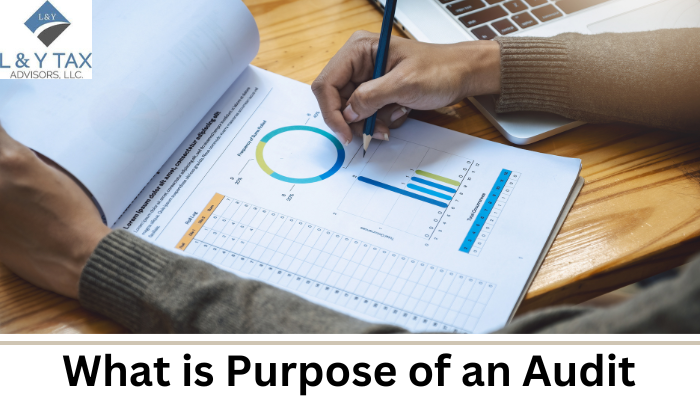
What is Purpose of an Audit?
Do you know what is purpose of an audit? It is essential for guaranteeing the precision, reliability, and integrity of financial data and organizational procedures. Qualified experts, usually auditors, carry out audits. They give stakeholders a thorough assessment of a company’s financial statements, regulatory compliance, and operational effectiveness.
L&Y Tax Advisors, LLC. presents a list of top 5 goals that explain what is purpose of an audit and why businesses and organizations need them.
Certifying Monetary Accuracy
The fundamental objective of an audit is to confirm the completeness and correctness of financial accounts. Auditor verification of the accuracy of the financial information provided to stakeholders is achieved by looking through:
- Financial records
- Transactions
- Accounting procedures
Sustaining investor trust and guaranteeing financial reporting transparency necessitate this verification.
Compliance with Regulatory Requirements
Several laws, rules, and guidelines govern organizations’ accounting and operational procedures. A business can avoid legal repercussions and preserve its reputation by having an audit, ensuring it complies with certain statutory obligations. Audits also check for compliance with industry-specific rules:
- The International Financial Reporting Standards (IFRS) worldwide
- Sarbanes-Oxley Act for US publicly listed companies
Enhancing Internal Controls
An organization’s internal controls are assessed and improved with the help of audits. Internal controls are systems and practices intended to protect resources, stop fraud, and guarantee the integrity of financial documentation.
Auditors can spot flaws or potential areas for improvement by:
- Evaluating the effectiveness of these controls
- Assisting businesses in lowering risks
- Increasing operational efficiency
Fraud Detection and Prevention
The detection and prevention of fraud is yet another essential objective of an audit. Auditors are taught to recognize warning signs and unusual activity that might indicate fraud.
Auditors can detect fraudulent activity by carefully reviewing and evaluating financial data. They ensure that the necessary precautions are taken to prevent it from happening again. An organization’s integrity and reliability depend heavily on this preventative action.
Reassure Accuracy to Stakeholders
Audited monetary records assist stakeholders in making wise decisions. Our professionals guarantee that your financial information is accurate and error-free.
This guarantee bolsters the organization’s credibility and trust, encouraging sound decision-making and long-term partnerships with stakeholders.
Read about the IRS & state audit representation.
The Bottom Line
Knowing what is purpose of an audit goes beyond just confirming financial correctness. It includes guaranteeing regulation adherence, improving internal controls, identifying and stopping fraud, and giving stakeholders confidence. By accomplishing these goals, audits are essential in fostering accountability, reliability, and openness inside businesses. Audits are a crucial instrument for preserving financial integrity and building stakeholder confidence, regardless of the size of the company – large, small, or nonprofit.
Read More:


